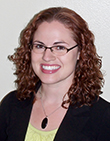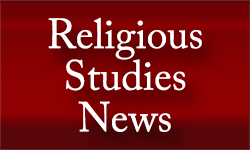|
 Emma M. Brodeur is a PhD student in the Department of Religion at Syracuse University. She received a bachelor's degree with individual concentration in religion at the University of Massachusetts in Amherst, and an MA in religion from Syracuse University. Her research and teaching interests include Continental philosophy and modern Jewish thought with a focus on the intersections of aesthetics, religion, and politics. Emma M. Brodeur is a PhD student in the Department of Religion at Syracuse University. She received a bachelor's degree with individual concentration in religion at the University of Massachusetts in Amherst, and an MA in religion from Syracuse University. Her research and teaching interests include Continental philosophy and modern Jewish thought with a focus on the intersections of aesthetics, religion, and politics.
Brodeur has presented multiple papers at the local and national levels of the AAR. She has twice presented papers on philosophy, religion, and deaf studies in the Religion and Disability Studies Group of the AAR. She has also presented papers on medical rhetoric in the early modern and ancient periods with attention to questions of ritual, magic and writing.
Brodeur has served as the student director of the Eastern International Region of the AAR and a member of the Graduate Student Committee of the AAR for the past two years (2011–2013). She has also served as copresident of the Religion Graduate Organization at Syracuse University (2011–2012), as the graduate student admissions representative of the Department of Religion at Syracuse University (2013), and as senator on the University Senate and Graduate Student Organization of Syracuse University (2009–2013).
Statement on the AAR
Having served on the Graduate Student Committee (GSC) of the AAR for the past two years, I have been delighted to witness and engage the efforts of my fellow colleagues to develop programming that enhances graduate student professional development and participation at the annual AAR conference. While much of a graduate student's success depends upon his or her work and relationships with mentors and colleagues at his or her academic institution, the AAR has long been an important organization that gives graduate students access to wider networks of scholarship, resources and communities that not only shape the field of religion today but also the professional landscape of religion scholars. But access is not enough. The GSC is therefore an invaluable asset to the AAR. Comprised of smart and creative individuals whose leadership and passions speak more directly to the needs, concerns and aspirations of graduate students, the GSC plans helpful programming in conjunction with students, faculty and professionals that address the multiple axes of professional development, including pedagogy, research and service, as well as the exigencies of graduate student life more generally.
Should you elect me as the Student Director of the AAR, I would like to continue to support the already strong labors of the GSC. In addition, I would like to collaborate with others in order to think of constructive, pragmatic ways to bridge conversations about the state of the job market and the state of graduate studies. While the “job market” has been and continues to be a “hot topic” integral to much of the work the GSC does at the annual conference, such as round tables dedicated to practical advice on how to perform in academic interviews or how to re-tool a CV in order to apply for non-academic professions, I would also like to engage in a collective effort to discuss how graduate programs are or are not or can or cannot meet this challenge. In other words, what can students, faculty and administrators do now within graduate programs to meet the constraints of a diverse field in high demand but under economic onslaught? How might we shift the conversation from one that places the bulk of the demands on an individual graduate student to “succeed” on the job market to one that investigates how graduate programs or institutions are training and supporting graduate students while taking a vested interest in the state of the job market? Or, how do we re-imagine the historical and structural framework of graduate studies, including coursework, language requirements, peer and mentor relationships, professionalization programming, scholarship, technology, etc., in service of our discussions about the job market?
I would also like to see and help the GSC find ways to incorporate our various theoretical and research interests in the study of religion(s) into our conversations and programming on professional development. If what we do and think as religion “scholars” is important, then it should shape how we form and inform ourselves and others as students, scholars and the public. How does what we study, for example, influence how we teach? Or how do our theoretical insights inform our job search? Or how do our current and imagined subject positions affect what and whom we study, teach and engage? And how might we take these questions into account when we discuss the possibilities and contours of academic employment, non-academic employment, publishing, mentoring, activism, teaching, etc.?
I would be delighted to serve as Student Director and would be committed to strengthening existing programs while also working with others, including the Graduate Student Committee and the Board of Directors, to develop creative and constructive ways to respond to and build upon the changing currents of graduate student needs.
|
 Kristy L. Slominski is a doctoral candidate in religious studies at the University of California, Santa Barbara, where she is also completing a doctoral emphasis in feminist studies and a certificate in college and university teaching. She specializes in sexuality and gender within American religious history and is currently writing her dissertation, “An American Religious History of Sex Education,” which covers the late nineteenth century to the present. She received her MA in religious studies from UCSB in 2009 and her BA in religious studies and interdisciplinary studies from Michigan State University in 2007. Kristy L. Slominski is a doctoral candidate in religious studies at the University of California, Santa Barbara, where she is also completing a doctoral emphasis in feminist studies and a certificate in college and university teaching. She specializes in sexuality and gender within American religious history and is currently writing her dissertation, “An American Religious History of Sex Education,” which covers the late nineteenth century to the present. She received her MA in religious studies from UCSB in 2009 and her BA in religious studies and interdisciplinary studies from Michigan State University in 2007.
Since she joined the AAR in 2006, Slominski has served the organization in multiple leadership capacities. On the national level, she has served three years on the Graduate Student Committee (2010–present). Within the AAR Western region, she has served as elected student representative and board member (2010–present), chair of the Nineteenth Century Section (2009–2012), and founder and chair of the Graduate Student Professional Development Section (2012–present). In addition to her research presentations at regional and national conferences, she has organized and led workshops on professional development for regional and national AAR meetings, as well as for her department and university. For further details, visit http://kristyslominski.wordpress.com.
Statement on the AAR
When I first decided to serve the AAR as a student representative on the national Graduate Student Committee and the Western Region’s board of directors, I wanted to help others in my situation. As a first-generation college student, my early years of graduate school convinced me that it is often a confusing, liminal experience and that graduate students can help each other navigate it successfully. One of my goals has been to expand opportunities within the AAR for professional development so that graduate students can make strategic choices during their training and gain the skills necessary to thrive in post-graduate careers. To this end, I created a new section within my region dedicated to professional development, and I helped to set up regional Facebook pages for student members to share opportunities, resources, and strategies. I helped to organize Annual Meeting panels on the job market, as well as a student roundtable series, which included workshops on teaching, planning graduate student conferences, and studying for comprehensive exams. To supplement this work, I created an online collection of professional development resources for graduate students in religious studies: http://scholarsinprogress.wordpress.com.
As the national Student Director, I would continue to emphasize the importance of graduate student professional development for its benefits to students and the academy as a whole. In order to build upon the tradition of Annual Meeting panels and roundtables that are labeled “Especially for Students,” I want to improve our understanding of graduate student needs by conducting a survey of student members. This would allow us to respond with student programming and resources that are most needed. To equip new student members to fully utilize the AAR, I plan to create an online Orientation Guide explaining the relevant structures and programs of the organization and offering strategies to prepare for the Annual Meeting. I also hope to collaborate with the working groups that launched the new AAR mentoring program, which offers a much needed service and should provide insight into the factors that create successful mentoring relationships.
The Graduate Student Committee, which is chaired by the national Student Director, has recently transformed from nationally appointed student leaders to regionally elected student representatives, and I am eager to see it through this transition. This change means that many regions now have student representatives for the first time, and that these new positions serve the student membership on the regional and national levels. As the first member of the committee to serve in this dual role, I have assisted in assessing the implications of this change for regional policies and national structure. Additionally, I created a handbook for new committee members and an archive of past materials to serve as resources during and after the transition. As chair, I would be prepared to help the committee adjust to its new connection to the regions by expanding its communication to the regional boards, building upon the new regional student Facebook pages, and developing regional student programming and leadership opportunities.
Lastly, I would take seriously my responsibility of representing students on the national AAR board of directors. My familiarity with the structure and programs of the AAR, as well as the unique characteristics and operating agreements of each AAR region, will allow me to assess how my decisions on the board will impact graduate students. As graduate student experiences continue to evolve in response to changing program structures, university funds, and job market realities and possibilities, I want to help facilitate the AAR’s critical reflection on the causes and effects of these conditions in relation to multiple levels of our organization and our individual scholars.
|


 Emma M. Brodeur is a PhD student in the Department of Religion at Syracuse University. She received a bachelor's degree with individual concentration in religion at the University of Massachusetts in Amherst, and an MA in religion from Syracuse University. Her research and teaching interests include Continental philosophy and modern Jewish thought with a focus on the intersections of aesthetics, religion, and politics.
Emma M. Brodeur is a PhD student in the Department of Religion at Syracuse University. She received a bachelor's degree with individual concentration in religion at the University of Massachusetts in Amherst, and an MA in religion from Syracuse University. Her research and teaching interests include Continental philosophy and modern Jewish thought with a focus on the intersections of aesthetics, religion, and politics. Kristy L. Slominski is a doctoral candidate in religious studies at the University of California, Santa Barbara, where she is also completing a doctoral emphasis in feminist studies and a certificate in college and university teaching. She specializes in sexuality and gender within American religious history and is currently writing her dissertation, “An American Religious History of Sex Education,” which covers the late nineteenth century to the present. She received her MA in religious studies from UCSB in 2009 and her BA in religious studies and interdisciplinary studies from Michigan State University in 2007.
Kristy L. Slominski is a doctoral candidate in religious studies at the University of California, Santa Barbara, where she is also completing a doctoral emphasis in feminist studies and a certificate in college and university teaching. She specializes in sexuality and gender within American religious history and is currently writing her dissertation, “An American Religious History of Sex Education,” which covers the late nineteenth century to the present. She received her MA in religious studies from UCSB in 2009 and her BA in religious studies and interdisciplinary studies from Michigan State University in 2007.